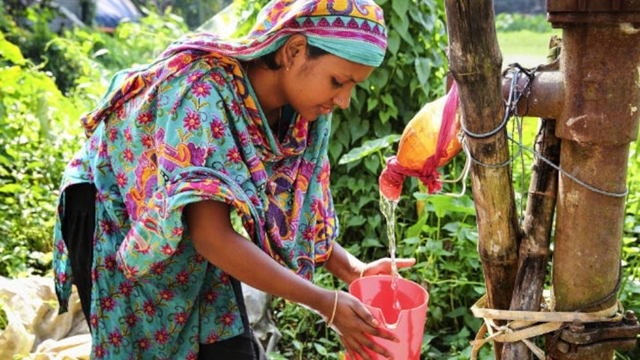FT Online
Published:2019-06-18 20:56:05 BdST
1 in 3 people globally does not have access to safe drinking waterBillions globally lack water, sanitation, hygiene: UN
Some 2.2 billion people around the world do not have safely-managed drinking water, according to a new report from the United Nations Children’s Fund (Unicef) and the World Health Organization (WHO).
On the other hand, 4.2 billion go without safe sanitation services and three billion lack basic handwashing facilities, it said.
“Mere access is not enough,” said Unicef’s Kelly Ann Naylor, Associate Director of Water, Sanitation and Hygiene (WASH). “If the water isn’t clean, isn’t safe to drink or is far away, and if toilet access is unsafe or limited, then we’re not delivering for the world’s children.”
The Joint Monitoring Programme report, “Progress on drinking water, sanitation and hygiene: 2000-2017: Special focus on inequalities”, finds that while significant progress has been made towards achieving universal access to WASH, there are huge gaps in the quality of services provided.
“Children and their families in poor and rural communities are most at risk of being left behind”, Naylor said, urging governments to “invest in their communities if we are going to bridge these economic and geographic divides and deliver this essential human right”.
The report reveals that since the turn of the century, 1.8 billion people have gained access to basic drinking water services, but vast inequalities in accessibility, availability and quality prevail.
Estimates show that 1 in 10 people still lacks basic services, including 144 million individuals who drink untreated surface water. And the data illustrates that 8 in 10 people in rural areas lack access to these services.
“Countries must double their efforts on sanitation or we won’t reach universal access by 2030,” said Maria Neira, WHO Director, Department of Public Health, Environmental and Social Determinants of Health.
“If countries fail to step up efforts on sanitation, safe water and hygiene, we’ll continue to live with diseases that should have been long ago consigned to the history books”, she spelled out. “Investing in water, sanitation and hygiene is cost-effective and good for society in so many ways.”
While open defecation has been halved since 2000, from 21 percent to 9 percent, 673 million people continue this practice in ‘high burden’ countries. Moreover, in 39 countries, the majority of which are in sub-Saharan Africa, the number of people openly defecating has increased.
The report also highlights new data showing that in 2017, three billion people lacked basic soap and water handwashing facilities at home, including nearly three quarters of those in the Least Developed Countries category.
Every year, 297,000 under-age-five children die from diarrhoea linked to inadequate WASH. Poor sanitation and contaminated water also help transmit diseases, such as cholera, dysentery, hepatitis A, and typhoid.
“Closing inequality gaps in the accessibility, quality and availability of water, sanitation and hygiene should be at the heart of government funding and planning strategies”, Naylor stressed. “To relent on investment plans for universal coverage is to undermine decades worth of progress at the expense of coming generations.”
Since 2000, the proportion of the population practicing open defecation has been halved, from 21 per cent to 9 per cent, and 23 countries have achieved near elimination, meaning less than 1 per cent of the population is practicing open defecation, according to Unicef.
Yet, 673 million people still practice open defecation, and they are increasingly concentrated in ‘high burden’ countries, it said.
Worse, in 39 countries, the number of people practicing open defecation actually increased, the majority of which are in sub-Saharan Africa where many countries have experienced strong population growth over this period.
Unauthorized use or reproduction of The Finance Today content for commercial purposes is strictly prohibited.


